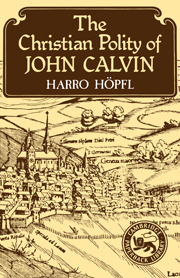Book contents
- Frontmatter
- Contents
- Preface
- Note on sources, orthography, notes and translations
- Introduction
- 1 The training of a lawgiver
- 2 The Institution: the first version
- 3 The first public ministry
- 4 Reconstruction
- 5 The Institution of 1543
- 6 Geneva and Calvin, 1541–64
- 7 The civil order of a Christian commonwealth
- 8 Political morality in the thought of Calvin
- 9 The laws and mores of a Christian commonwealth
- 10 Unfinished business: a speculative summary and postscript
- Appendix I Calvin's conversion
- Appendix II Predestination
- Notes
- Bibliography
- Index
- Cambridge Studies in the History and Theory of Politics
9 - The laws and mores of a Christian commonwealth
Published online by Cambridge University Press: 24 October 2009
- Frontmatter
- Contents
- Preface
- Note on sources, orthography, notes and translations
- Introduction
- 1 The training of a lawgiver
- 2 The Institution: the first version
- 3 The first public ministry
- 4 Reconstruction
- 5 The Institution of 1543
- 6 Geneva and Calvin, 1541–64
- 7 The civil order of a Christian commonwealth
- 8 Political morality in the thought of Calvin
- 9 The laws and mores of a Christian commonwealth
- 10 Unfinished business: a speculative summary and postscript
- Appendix I Calvin's conversion
- Appendix II Predestination
- Notes
- Bibliography
- Index
- Cambridge Studies in the History and Theory of Politics
Summary
It is now time to consider what specific measures and policies Calvin sheltered under the general labels and maxims that served him for his description of the magistrates' office. As we have seen, the connection between principle and practice was not explicated by Calvin. And, to anticipate the results of the investigation, it appears that Calvin entertained a set of perfectly conventional views about the conduct of government and the practices and mores of a well-ordered commonwealth. Indeed, as has been ‘discovered’ in study after study, almost all the laws and arrangements supposed to be distinctively Genevan and Calvinian prove to have had their parallels elsewhere, amongst Romanists as well as evangelicals, and both contemporaneously and in previous centuries. What was distinctive about Geneva and about Calvin's conception of the laws of a godly commonwealth is neither the content of these laws nor their theocratic orientation, but the rigour and impartiality with which these laws were enforced at Geneva, and the single-mindedness and lack of concession to current practice with which the organization of the church and the practice of pastors and magistrates were directed to its end.
Calvin could of course hardly have been unaware that his opinions on ‘moral’ matters were in most respects conventional, albeit peculiarly strict and severe, at any rate amongst godly men; but their conventionality or otherwise was an entirely secondary consideration for him. What counted, as far as his official doctrine was concerned, was their conformity with Scripture.
- Type
- Chapter
- Information
- The Christian Polity of John Calvin , pp. 188 - 206Publisher: Cambridge University PressPrint publication year: 1982

